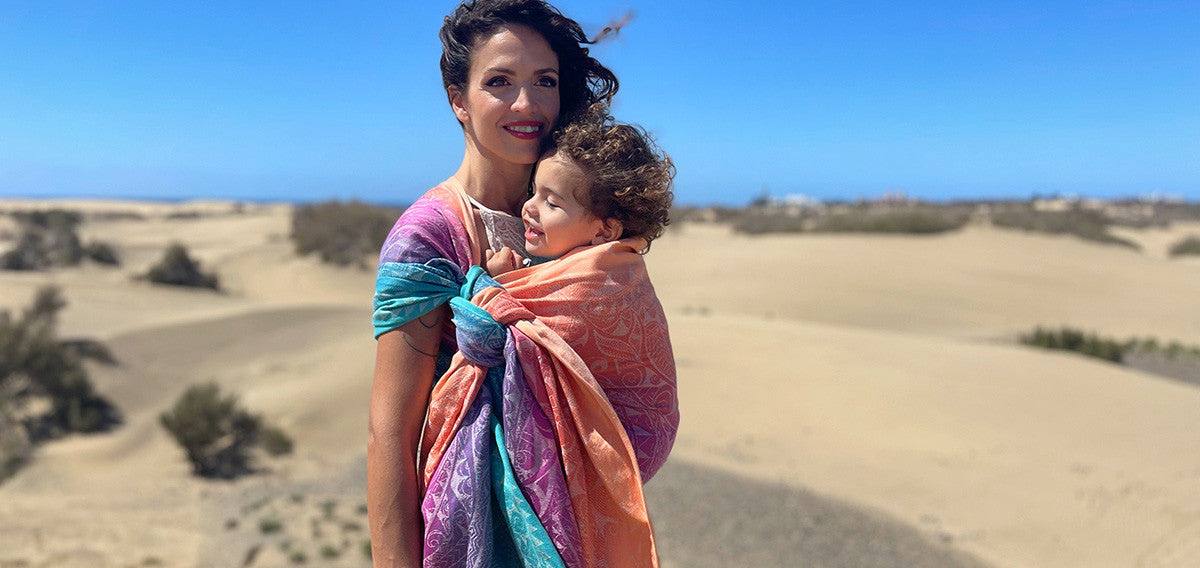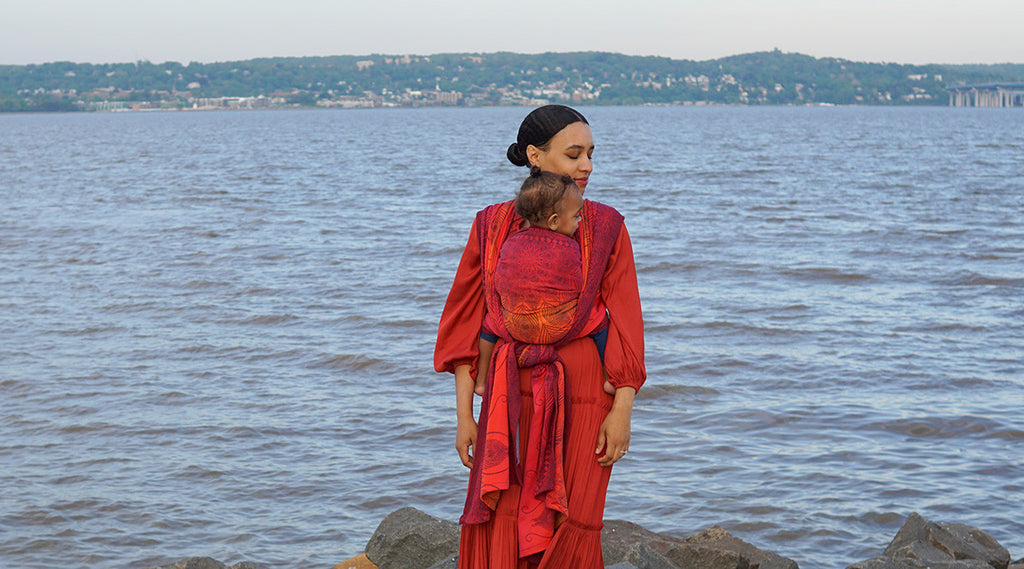When you first use a baby carrier or sling you may be surprised at how quickly your baby settles. Babies love being held close, recreating their time in the womb and helping to soothe them during this fourth trimester.
With babies being so peaceful in the sling, parents often wonder - can you babywear too much? Will carrying my baby in a sling for too long be bad for them?
Can I Hurt My Baby if I Carry them in a Sling for Too Long and Does Babywearing Cause Container Syndrome?
Container syndrome is when a child spends an excessive amount of time in devices like car seats or bouncy chairs which then hinders their development, preventing them from meeting milestones and potentially causing issues such as torticollis and flat head syndrome. These products hold the baby in static positions where they are not required to use their core muscles and are restrained in one position.
This issue is often mentioned in the media and occasionally baby carriers are included in the list of products parents should be wary of using too much. However, this is untrue.
Although baby wraps, ring slings and carriers also hold babies, they do not cause the same developmental issues as baby seats and positioners. In fact they can help alleviate some of these issues. When you carry your baby, in arms or in a correctly fitted sling, they do not sit passively but are still engaging the muscle groups which are important for their development. Carrying in an upright position in a sling helps babies engage their head, neck, stomach and back muscles in response to your movement. Even though they are well supported, a sling encourages a more active role than the passive position they are in in a car seat or pram.
If your sling supports your little one safely and in a spread squat position then you don’t have to limit their time in a sling.
Carrying your baby in a wide-based, ergonomic sling is great for their physiological development.
Unlike when they sit passively in a seat, a sling:
- supports a child’s natural position
- can aid optimal hip development
- improves their balance
- builds their core muscles
- reduces the risk of flat head syndrome, because it removes any pressure from the back of their head.
How Long Can I Carry My Baby in a Baby Carrier or Sling?

Carrying your baby is the biological norm, babies are designed to be kept close and carried by caregivers.
Using a sling, or in-arms carrying provides the best environment for their development; helps regulate their temperature and heart rate, soothes and calms them, helps them sleep, improves bonding, promotes cognitive and social development, aids lactation, advances their communication skills and promotes their physiological development.
Carrying provides the best environment for baby's development, as it:
- helps regulate their temperature and heart rate;
- soothes and calms them;
- helps them sleep;
- improves bonding;
- promotes cognitive and social development;
- aids lactation, and
- advances their communication skills and promotes their physiological development.
As being carried is natural for babies there’s no set time limit for how long they can stay in the sling, provided you're both happy and comfortable.
When we consider our development as a species, babies would have been carried in arms most of the time. It is only relatively recently in our history that we have invented prams, and even more recently that we have car seats, walkers, bouncers and swings.
Babies and older children thrive from physical contact and the bonds and attachment this helps to build. They were never designed to spend long periods of time lying down away from caregivers. That’s not to say that modern inventions like prams and car seats aren’t incredibly useful when used mindfully, and they are often necessary in our lives today. However, if you’re happy to carry your child then don’t worry about overdoing it, you’re just doing what comes naturally.
Can You Babywear Too Much?
Babies, and caregivers, do benefit from taking breaks from carrying. As they develop, babies need time to move freely and kick their legs to help them build muscles and learn new skills such as rolling, sitting, crawling and walking. So if you were to carry your baby without ever taking them out the sling this could have a negative impact on their development.
However, young babies are frequently in and out of slings or put down, for feeds and nappy changes. If you carry your baby regularly it’s likely you will notice their cues quickly and respond to them, babies will let you know if they’re not happy.
As they get older they’ll be happy to spend more time on the floor playing or just kicking their legs, another important development stage. Playing helps brain development and is fun for you too, watching your baby become more interactive with you. But older babies still enjoy napping in the sling or being soothed by your closeness.
If I Carry My Baby Too Much, Will They Become Clingy?

Parents are often told by our society that they will create "clingy children" by holding or carrying them too much. This is one of many myths about babywearing which is untrue. Keeping your baby close and soothing them creates a safe environment. If a baby is held close and soothed often this helps to form a connection in the brain and develops a strong bond between you, also known as a secure attachment.
There's lots of evidence to suggest that secure attachment in childhood leads to confidence and independence in later life. It aids the ability to form healthy relationships and to be more equipped to deal with stressful times.
Babies love being kept close and carrying your baby is normal for our species. Evolution has given rise to a host of benefits when children are held and carried by their parents or caregivers. So enjoy using your sling, be guided by your instincts and your baby, and enjoy the cuddles.
Written by Jillyan Graham
Jill is a Baby Carrying Consultant based in the Scottish Borders and is Mum to two girls.








